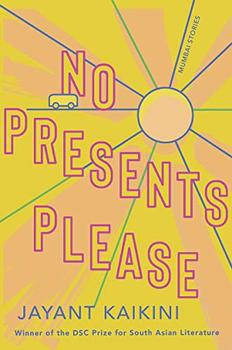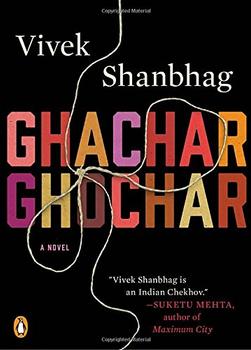Summary | Excerpt | Reviews | Beyond the book | Read-Alikes | Genres & Themes | Author Bio

Claiming that you can't be an Indian writer without politics somehow seeping into your work, Neel Mukherjee makes no bones about his novel, The Lives Of Others, being a deeply political animal. "Now that we have been bludgeoned into quiescence in these late-capitalist times by that most amoral of all entities, the free-market, that imperative seems more urgent, more political than ever," he has said of the social agenda for his Booker-shortlisted book.
Supratik Ghosh, the young idealist scion of a Kolkata industrial family, serves as the perfect vehicle for Mukherjee's political agenda. While most in his family don't give a second thought to the deeply entrenched barriers wrought by caste and class, these injustices gnaw at Supratik endlessly. Being a politically active student member of the Communist Party of India is not enough, a mere drop in the bucket, especially when nothing seems to change. Supratik decides to leave home, noting his motivation in a letter to his mother: "Ma, I feel exhausted with consuming, with taking and grabbing and using. I am so bloated that I feel I cannot breathe any more. I am leaving to find some air, some place where I shall be able to purge myself, push back against the life given me and make my own."
What Supratik doesn't realize is that the Ghosh family's better days are squarely in the rearview mirror, that the life he so berates is actually maintained through large infusions of cash by selling off mills or jewelry. It is no wonder then that his mother can't fathom the complaints leveled against their lifestyle. "Do you run the family?" she asks, incredulous. "What do you know of how it works?"
Set in the India of the '60s, The Lives of Others narrates Supratik's increasingly volatile involvement in the communist party's activities in Bengal's agrarian countryside, and juxtaposes these deeply soul-searching passages against the more mundane, yet lively, interactions between the various members of the extended Ghosh family. Supratik recounts his experiences through a series of letters he writes to an unnamed recipient whose identity slowly comes into focus toward the end of the book.
Mukherjee expertly fuses his political ambitions into both narrative plots. While Supratik's story carries its agenda overtly, the story of the Ghoshes also serves to reinforce Mukherjee's belief that the family is the primary unit of exploitation. "All superstructures, including the family, rest on the base of one thing, and one thing only – economics," he writes echoing Marx. "The family is the first and the primary unit of oppression and exploitation...All these vaunted bourgeois values that prop up society — love, duty, honour, respect — all rest on power-relations lubricated by economics." In Lives, this theory shows itself to be true in many ways: the members of the Ghosh family comprise three generations: the patriarch Prafullanath Ghosh and his wife Charubala; their three sons and their families; an unmarried daughter, Chhaya; and Purba, the widow of the youngest son, and her two children. While the wives eternally squabble for larger portions of the family's diminishing income, everyone ignores the fact that Purba and her kids are making do on the barest of meals and living in what amounts to a storage closet on the bottom floor of the large mansion. The family servant Madan, who has moved to Kolkata from the rural areas of Bengal, has worked for the Ghoshes for years and has seen their children grow before his very eyes. While he is generally considered part of the family, there are still boundaries clearly defined by his caste and class that later come to haunt him in interesting ways. The older Ghosh sons also resent they've inherited a dying business, and now have to share the burden of resuscitating a floundering beast.
Mukherjee's descriptions of a monsoon-soaked countryside, and of a gorgeous shaat-lahari haar (seven strand necklace), are things of beauty. It is especially commendable that in a plot ripe with the possibility of melodrama, he steers clear of any hint of it. Yet the languorous writing, Supratik's endless navel-gazing, and the Ghosh family's internal petty jealousies start to slow down the narrative. Lives would have been even better had its prose been reined in just a touch.
"Boro-babu, the world does not change, you destroy yourself trying to change it, but it remains as it is," Madan advises Supratik. "The world is very big, and we are very small. Why cause people who love you to go through such misery because of it?" The irony, that everyday lessons can be obtained and lived right at home, is not lost on Supratik. As he gradually comes to terms with life's harsh realities, Mukherjee shines light on many a burning question and succeeds in his primary mission to write a deeply political novel using a storyteller's most powerful tool: empathy.
That even at the end, Supratik can't answer why "it is easier enjoining others, in distant villages, to break the walls of their historical conditions than to do the same violence to the fabric to his own social conditioning," is profoundly disquieting, not just to our protagonist, but to us, the reader. Because, if indeed, the perceived wisdom is that all social change must begin at home, why is that process so darned difficult? And more important, what does that tell us about our ability to effect meaningful reform?
![]() This review was originally published in The BookBrowse Review in November 2014, and has been updated for the
October 2015 edition.
Click here to go to this issue.
This review was originally published in The BookBrowse Review in November 2014, and has been updated for the
October 2015 edition.
Click here to go to this issue.

If you liked The Lives of Others, try these:

by Jayant Kaikini
Published 2020
For readers of Jhumpa Lahiri and Rohinton Mistry, as well as Lorrie Moore and George Saunders, here are stories on the pathos and comedy of small-town migrants struggling to build a life in the big city, with the dream world of Bollywood never far away.

by Vivek Shanbhag
Published 2017
For readers of Akhil Sharma, Mohsin Hamid, and Teju Cole, a haunting, masterly novel about a family splintered by success in rapidly changing India.
Your guide toexceptional books
BookBrowse seeks out and recommends the best in contemporary fiction and nonfiction—books that not only engage and entertain but also deepen our understanding of ourselves and the world around us.